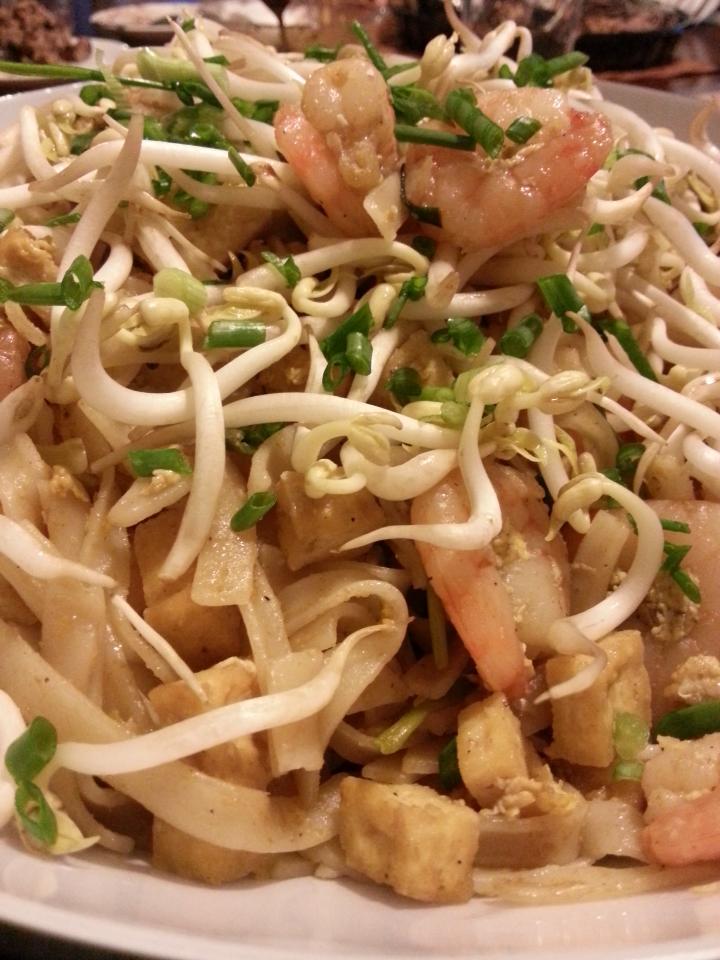 Pad Thai
was actually my first introduction into Thai cuisine. Although Pad Thai’s humble beginnings can be
traced to the street vendors of Thailand, don't let it's origin fool you, its flavor is fresh and complex and rivals any other noodle dishes found in Asia. Pad Thai truly exemplifies the taste of
Southeast Asian cuisine in that it is a perfect balance of salty, sweet, and
sour. It is perhaps the most ordered
dish in every Thai restaurant in the west. Here in Oslo, Thai food is quite
popular and readymade Pad thai sauce, frozen pad thai, and even pad thai kits
could be found at almost every grocery.
However these readymade sauces are nothing short of a disappointment.
Pad Thai
was actually my first introduction into Thai cuisine. Although Pad Thai’s humble beginnings can be
traced to the street vendors of Thailand, don't let it's origin fool you, its flavor is fresh and complex and rivals any other noodle dishes found in Asia. Pad Thai truly exemplifies the taste of
Southeast Asian cuisine in that it is a perfect balance of salty, sweet, and
sour. It is perhaps the most ordered
dish in every Thai restaurant in the west. Here in Oslo, Thai food is quite
popular and readymade Pad thai sauce, frozen pad thai, and even pad thai kits
could be found at almost every grocery.
However these readymade sauces are nothing short of a disappointment.
I never did understand why people even bother
buying these as it is relatively quite easy making pad thai from scratch. The ingredients in pad thai after all are
tamarind paste, fish sauce, and sugar. Most of the ingredients can be found in
Oslo’s “innvandrerbutikker” or literally “foreign shops.” Tamarind paste is the source of its sour taste
combined with the saltiness of fish sauce and the sweetness of sugar. The traditional recipe calls for palm sugar,
but living in Norway and living quite a distance from the center of Oslo, I
find brown sugar is a good substitute. Pad
thai also consists of prawns and/or chicken, eggs, flat rice noodles, and spring
onions. Additional ingredients such as
fresh bean sprouts, coriander leaves (cilantro for my US followers), additional
sugar, and lime can be served and added when plating. For an extra crunch I also like to add fried
tofu cubes.
Although the ingredients may seem to be quite
a lot and also may seem quite hard to make, it is actually quite simple. Some tips when making pad thai is to prepare
the sauce in advance. To get the right
balance, it is good to start off with 1:1:1 portion to balance the salt, sweet,
and sour. Although in this recipe I will give
approximate measurements, as a general rule, always go by your own taste and preferences. Another tip is not to overcook the rice
noodles and to follow the instructions on the package. I soak my noodles in hot water for at least
6-8 minutes. The noodles should be
relatively al-dente in order to avoid mushy noodles.
With all
these in mind, the result will be beautifully dry brownish noodles that are
perfectly balance in flavors. So enjoy!
Ingredients
·
⅓
cup fish sauce
·
½
cup palm sugar
·
½
cup tamarind juice concentrate
·
4
cloves garlic, minced
·
1
pack of dry rice noodles
·
4
cloves garlic, minced
·
1
½ cups thinly sliced chicken
·
1
½ cups of prawns
·
1
cup of tofu small cubes
·
2
eggs
·
1
bunch green onions cut into 1inch sections
·
1
packet of mung bean sprouts (reserve half for garnish)
·
1
bunch of coriander/cilantro (garnish)
·
Toasted
peanuts chopped (garnish)
·
Lime
wedge (garnish)
·
Dried
chili flakes (optional)
Instructions:
1. Prepare pad thai sauce by mixing
fish sauce, brown sugar, and tamarind concentrate. Stir sauce well to fully
dissolve brown sugar. Test the sauce to
your preference and adjust accordingly.
2. Soak noodles for 6-8 minutes in boiled
water (but not over the heating plate) and drain immediately rinsing with cold
water for a few seconds. Again, make
sure the noodles are al-dente and not over soft.
3. Pre fry tofu cubes in hot oil till
golden brown and crunchy. Set aside.
4. Heat 3 tablespoons of oil in a wok
or frying pan on high and cook raw chicken and/or shrimp for 3-4 minutes.
Remove meat/seafood into a small bowl.
5. Heat the remaining oil and then add
garlic to the wok and stir fry for 1 minute stirring the garlic mixture so it
will not burn. Add noodles and stir for 1 minute. Slowly add at least half of
the Pad Thai sauce stirring noodle mixture until well coated with sauce.
6. Add cooked meat/tofu/seafood back
and fry for 2-3 minutes. Move the noodle and remaining ingredients to the sides
of the wok. Add more oil to the wok and
crack an egg then scramble the egg till fully cooked.
7. Add remaining sauce, spring onions,
and sprouts and cook for one more minute or till noodles are no longer hard.
8. Plate noodles and garnish with chili
flakes, cilantro, remaining bean sprouts, lime wedges, and sugar.
